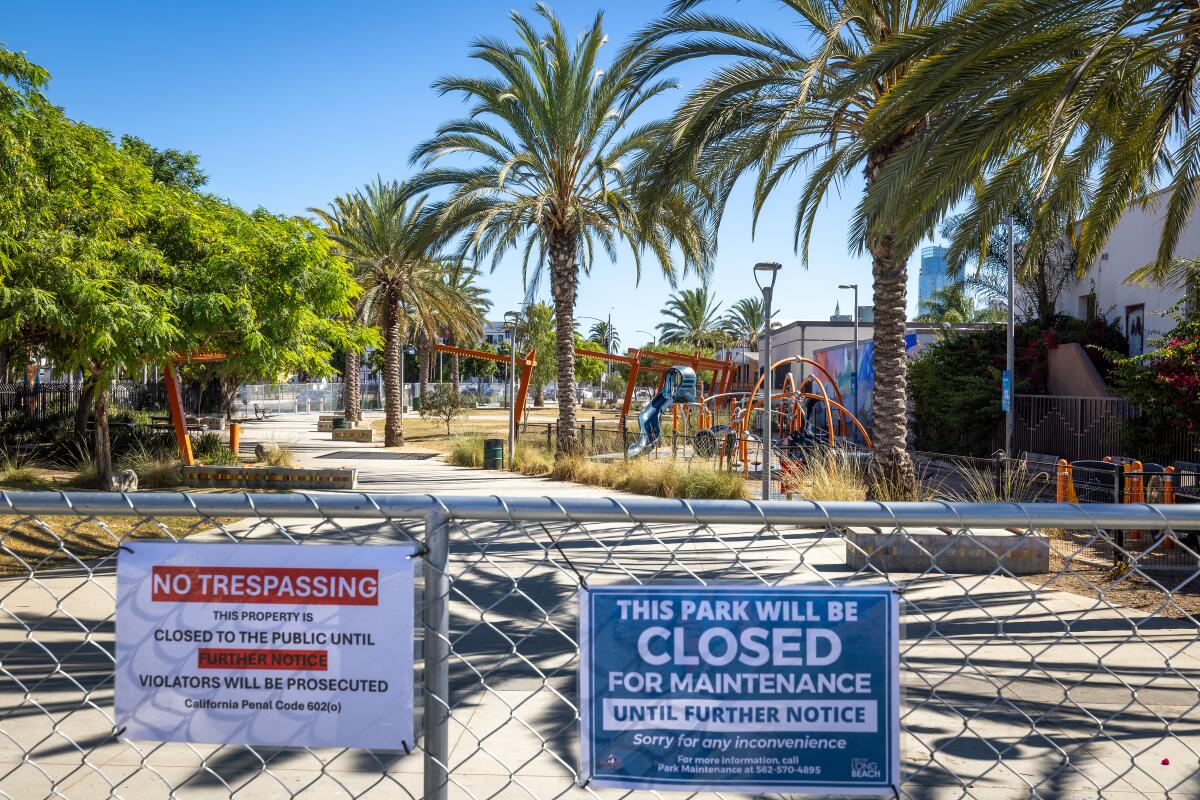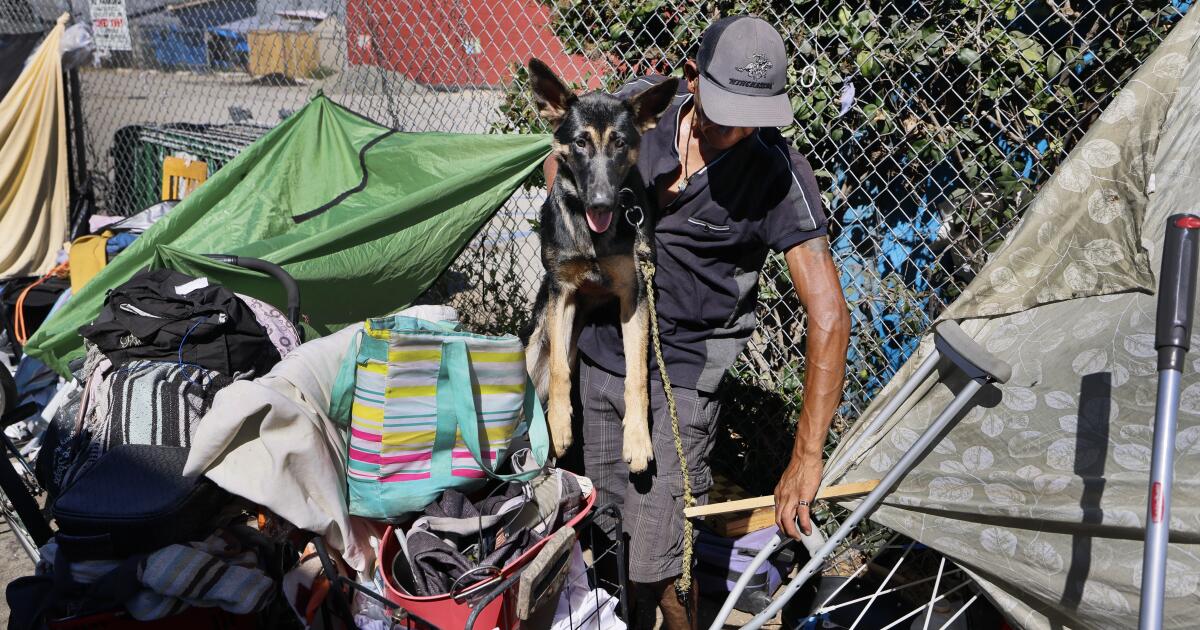In a small, oil-stained alley in Long Beach, under a yellow bedsheet tied to a chain-link fence, Fernando Gonzalez sat cross-legged, fighting off sleep amid the summer heat.
Until recently, the 55-year-old had been living with about a dozen homeless people at Gumbiner Park, a tiny green space nearby, across from the Museum of Latin American Art.
Outreach workers had visited the site for weeks, offering shelter beds and motel vouchers to people while warning them that the city would soon start enforcing its anti-camping laws.
That enforcement kicked off last week when police and city crews showed up to clear the area and fence it off for maintenance work. It was one of four parks targeted after being identified as trouble spots.
Gonzalez didn’t fault the city for clearing the space. He understood residents disliked the encampment. But he was frustrated that city workers couldn’t find him a bed before he was forced to leave the park.
“Here I am, asking to go indoors while others turn the help away,” he said. “It’s just unfair.”
A homeless man, center, confronts city workers, who are accompanied by police, as an encampment is cleared Aug. 19 at Gumbiner Park in Long Beach.
(Brian van der Brug / Los Angeles Times)
He and two others moved to the alley to be closer to the park, thinking to make it easier for city workers to find them. But after more than a week, they said no one had stopped by.
California cities have long struggled to regulate public camping after court rulings made it unconstitutional to enforce anti-camping laws against homeless people.
But two months ago, lawmakers and law enforcement officials got a break when the Supreme Court ruled that public entities could ban people from sleeping or camping on public property, even if they had nowhere else to go.
Gov. Gavin Newsom applauded the ruling and ordered state agencies to start clearing encampments on state land; he urged counties and cities to do the same and threatened to withhold money from them if they didn’t make progress in removing people from the streets.
“If we don’t see demonstrable results, I’ll start to redirect money,” he said at the time. “This is a sincerely held belief that we need local government to step up. This is a crisis. Act like it.”
In response, Long Beach announced it would start clearing problematic encampments or those resistant to homeless services.
The city’s list included encampments at the Billie Jean King Library and its adjacent park. It also included Veterans Park, Gumbiner Park and Jenni Rivera Memorial Park.
Deputy City Manager Teresa Chandler said the city compiled the list from data it had collected through residential complaints, police responses and from outreach workers.
Although the city planned to issue citations and possibly make arrests, it said it would continue to focus on a “human-centered” approach to clearing encampments by first offering shelter and motel vouchers.
“It’s a balance,” she said. “I don’t want to cause more harm and add more stress to people as they’re moving.
“You know, they have important documents like IDs and birth certificates,” she added. “And when you’re moving a lot, you’re more likely to lose those things. And then it’s all that more challenging for our case managers to round those items up again.”
Chandler said she also worried that clearing encampments would cause people to scatter throughout the city and make it harder for outreach workers to locate them. Homeless people sometimes don’t agree to take up offers of shelter until after multiple visits by workers.
There are 3,376 people experiencing homelessness in Long Beach, of which 72% of the population lives in tents or makeshift shelters, according to the city’s 2024 homeless count.
After spending about $60 million on addressing homelessness, the city saw a 2% decrease for the first time in seven years, according to the homeless count.
Still, the city, like many other municipalities in the state, lacks transitional housing, as well as more permanent housing that would free up the shorter-term units. State records show that the city plans to build 18,655 housing units, an effort that began in 2021 and is meant to extend through 2029. At least 6,995 units were expected to be built over the last three years, but the city fell short of that goal by 31%, state data show.
The city also needs about 885 more shelter beds for its 2,455 unsheltered people, according to city records. Chandler said the city had 1,300 beds and planned to add 277 in the near future, some of which will be provided to couples.
Still, city officials acknowledge the shortage underscores a need for a compassionate approach.
In a written statement, the Long Beach Police Department said it would continue to support the city’s plan in addressing encampments but would not hesitate to enforce the law.
“The police department routinely participates in [city] encampment clean ups, following outreach efforts, and will continue to do so,” the statement said. But “whether participating in the interdepartmental approach or responding to concerns from residents and businesses, Long Beach police officers are not precluded from taking discretionary enforcement action to reduce crime or enhance safety based on the totality of circumstances they encounter.”
Two weeks ago, the city announced it would begin to crack down on encampments that pose a threat to public health and safety. The city said it would give police the discretion to issue citations for violating the city’s anti-camping enforcement. They said police would also make arrests if other crimes were also committed.
Long Beach city and police officials did not respond to further questions about the cost of fines or the number of citations that would lead to an arrest.
The city prosecutor could not be reached for comment.
Chandler said the goal is to connect with people before taking a more aggressive approach.
“We cannot arrest our way out of homelessness, we have to have housing, and we have to have support for people,” she said. “We need to connect to the people living in those tents in order to really make a difference.
“Even if people receive citations,” she added, “we also have programs that will circle people back to supportive services.”
Residents and businesses The Times spoke with approved of the city’s new effort to address encampments.
Austin Metoyer, president and chief executive of the Downtown Long Beach Alliance, a nonprofit that manages the city’s downtown improvement districts, said the encampments had caused an array of problems for business owners including property damage, defecation and harassment of customers.
“They’re happy to see some action,” Metoyer said. “I do think the approach that the city is taking is fair. We’re not going to solve this problem by pushing people to a different area; we’re going to need housing.”

Gumbiner Park is fenced off after being cleared of a homeless encampment. It was one of four parks targeted by Long Beach.
(Allen J. Schaben / Los Angeles Times)
At the park adjacent to the Billie Jean King Library, Pedro Martinez, 50, daughter Heidie, 27, and 4-year-old granddaughter Marelle were walking around, noticing the lack of tents in the area.
Martinez said whenever he visited the library with his granddaughter, he would have to enter through the front to avoid the homeless people congregated behind the library.
“It wasn’t that great,” he said.
“We understand that they need help,” his daughter said, “but I believe they shouldn’t be in certain places like right here because kids can’t possibly play.”
But looking around, they were happy to see the park was mostly clear of homeless people.
Nearby, a woman practiced shooting a basketball, children played on swing sets, and people walked their dogs.
Daria Crocket, 44, who sleeps outside of the library next to the park, said police officers had told her she and others couldn’t camp out in the area anymore.
“It’s disappointing,” Crocket said. “It makes me feel like I have no rights.”
Sitting on a blue camping chair under the shade of a tree, Crocket said despite the warnings by police she planned to stay in the area.
“It would probably be safer for me to go to jail,” she said. “People have tried to rape me before.”
She paused for a few seconds, getting up from the chair and slowly walking toward the library before mumbling: “But I don’t want no record.”
